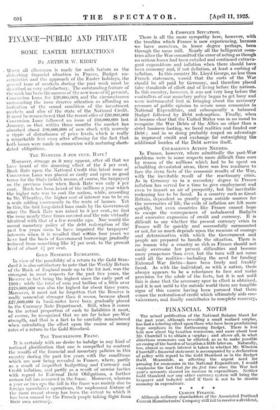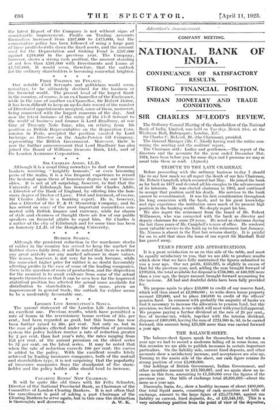FINANCIAL NOTES The actual publication of the National Balance Sheet
for the past year, although revealing a small realized surplus, has had a sobering effect upon those who have been proclaiming huge surpluses in the forthcoming Budget. There is less talk now about big taxation remissions, and more about how Mr. Churchill is to obtain a Eurplus - and above all, in what directions economies can be effected, so as to make possible an easing of the burden of taxation a little later on. Naturally, too, almost as much interest is taken in whether Mr. Winston Churchill's financial statement is accompanied by a declaration of policy with regurd to the Gold Standard as in the Budget itself. Meanwhile, as affecting the urgent need for pressing for economies in the National Expenditure, I would emphasise the fact that for the first time since the War last year's accounts showed an increase in expenditure. Neither Gold Standard nor any other currency system will bring the taxpayer and industry relief if there is not to be drastic economy in expenditure.
CEMENT FINANCE.
Although ordinary shareholders of the Associated Portland Cement Manufacturers' Company still fail to receive a dividend,
. . . the latest Report of the Company is not without signs of considerable improvement. Profits on Trading Accounts themselves increased from £387,000 to £475,000, but the conservative policy has been followed of using a large part of these profits to write down the fixed assets, and the amount used for the Depreciation and Sinking Fund is £297,000 against £218,000 in the previous year. The Company, however, shows a strong cash position, the amount standing at not less than £591,000 with Investments and Loans at £1,787,000. It :would seem, therefore, that the outlook for the ordinary shareholders is becoming somewhat brighter.
* *
FROM POLITICS TO FINANCE.
Our notable Civil Servants and politicians would seem, nowadays, to be ultimately destined for the business or the financial world. The present head of the largest Bank in the country, of course, is an ex-Chancellor of the Exchequer, while in the case of another ex-Chancellor, Sir Robert Horne, it has been difficult to keep an up-fo-date record of the number of Directorial appointments accepted, some of them, moreover, being connected with the largest concerns of the day. And now the latest instance of the entry of the Civil Servant to the world of business and finance is Lord Bradbury, at one time of Treasury Note fame, who, on retiring from his position as British Representative on the Reparation Com- mission in Paris, accepted the position vacated by Lord Incheape as Director on the Anglo-Persian Oil Company, representing the British Government. Moreover, there is now the further announcement that Lord Bradbury has also joined the Board of Williams Deacons Bank, Ltd., and of the London Assurance Corporation.
* * * * - SIR CHARLES ADDIS, LL.D.
Although it is a usual thing nowadays to find our foremost bankers receiving " knightly honours," or even becoming peers of the realm, it is a less frequent experience to record the bestowal upon them of honorary degrees by our Univer- sities. It is not at all surprising, however, to find that the University of Edinburgh has honoured Sir Charles Addis, a Director of the Bank of England, by offering him the hon- orary degree of Doctor of Laws. First and foremost, of course, Sir Charles Addis is a banking expert. He is, however, also a Director of the P. & 0. Steamship Company, and he has served on some of the most important committees con- nected with British finance and currency, while for charm of style and clearness of thought there are few of our public speakers on financial affairs to equal him. Sir Charles is a native of the city of Edinburgh and for some time has been an honorary LL.D. of the Hongkong University.
RUBBER SHARES.
Although the persistent reduction in the warehouse stocks of rubber in the country has served to keep the market for Rubber shares fairly firm, it will be noted that there is neither any great activity nor any marked advance in share values. The reason, however, is not very far to seek because, while the somewhat higher price for rubber is no doubt favourably affecting profits in the case of some of the leading companies, there is the question of costs of production, and the disposition for the moment is to await evidence from some of the actual reports themselves so that it can be seen how far the improved statistical position has affected the actual sums available for distribution to shareholders. All the same, given an improvement in general trade, the outlook for rubber seems to be a moderately favourable one.
LONDON LIFE ASSOCIATIONS BONUS.
The annual statement of the London Life Association is an excellent one. Previous results, which have permitted a rate of• bonus in the reversionary bonus section of 35s. per cent., had been regarded as good, but this bonus has now been further raised to 36s. per cent. Not only so, but in the case of policies effected under the reduction of premium system the policy holders receive a rate of reduction greater by 2 per cent. than last year'S rate, the rates ranging from 133 per cent, of the annual premium on the oldest series to 52 per cent. on the latest series. It may be noted that when the rate of reduction exceeds 100 per cent. the. excess is added to the policy. With the excellent- results lately achieved by 'leading insurance coriipanieS, both of the mutual and shareholders type, it is not surprising that the popularity of insurance companies from the standpoint of the share- holder and the policy holder alike should tend to increase.
* * * * •
CLEARING BANKS' NEW CHAIRMAN.
It will be quite like old times with Sir Felix Schuster, Director of the National Provincial Bank; as Chairman of the Committee of London Clearing. Bankers. It is not often that the compliment is paid of asking a past Chairman of the Clearing.Bankers to serve again, but in this case the distinction
•











































 Previous page
Previous page